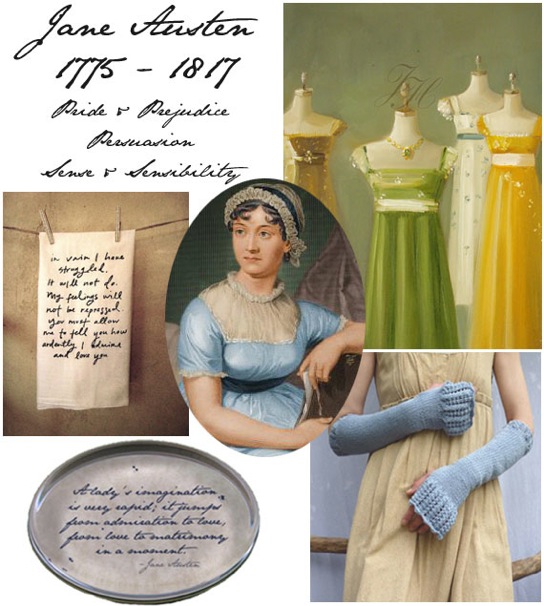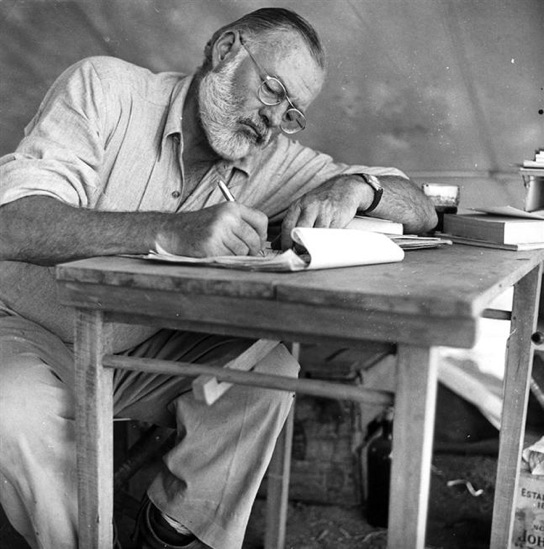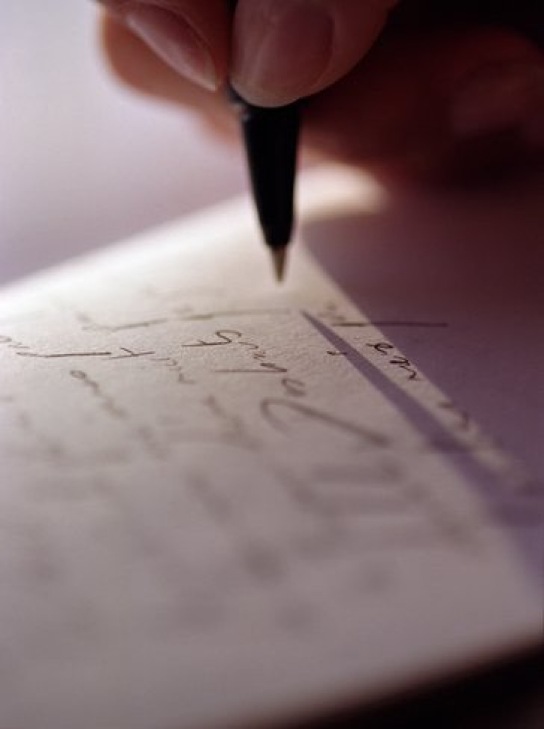“And while it’s unlikely that any of us would adopt the style of these writers verbatim, I like the idea of including a little nod, in your home or your wardrobe, to a favourite writer, character or book.”
A more perfectly bookish post, I may never publish. It’s all of my favorite things together: female authors, Etsy and Jane Flanagan of one of my daily must-reads: Ill Seen, Ill Said. In addition to sharing insightful thoughts and bits of inspiration, Jane owns the charming little webshop Coterie. Take a look at Jane’s curation of Etsy pieces, Women of Letters, a collection inspired by her favorite female writers including Jane Austen, Edith Wharton, Virginia Woolf and Flannery O’Connor.
And I love her thoughts on incorporating a love for all things literary into daily life :
book·ish/ˈbo͝okiSH/Adjective
1. (of a person or way of life) Devoted to reading and studying rather than worldly interests.
2. (of language or writing) Literary in style or allusion.
3. (of art and all manner of lovely things) devoted to the written word as a form of art and as a way of seeing the world.
4. (of SheWritesandRights.blogspot.com) anything of the aforementioned characteristics as they are found on the interwebs and reposted by Bethany, because bookish and writerly things always give reason for amusement.*
The Shrinking Margin.
If only there existed a magic button for my life, one that I could press to give me that time and space my mind needs to feel rested again. Today I find myself feeling cramped and small and crazed, oppressed by my insecurity. Oppressed by my inability to juggle and format and finish the things I need to do. Do you ever feel that way? This is how I’ve felt intermittently for the last few weeks.
Summer is my favorite season, because I feel an exuberance in the warmth of each day, an unquenchable need to celebrate life in all its green and flourishing glory. Each wedding, party, cook out, firework, each slice of watermelon and ice cold beverage wet with condensation is a joy to me. I don’t want it to end.
I don’t want to miss it.
I don’t want to miss it.
And so I struggle in this paradox: in a season that I should celebrate and relax and enjoy the lengthened days, I find myself so overcommitted and busy that the days feel like they’re flying by without me. My calendar and my mind are so full that I have no space to breathe and enjoy it. I find myself living in the margins of my life, which are shrinking by the second.
It’s no wonder, then, that when I think about writing, I’m too worried about whatever else I should be doing to feel at peace with my creativity. For me, writing is a process of roaming through the recesses of thought and imagination, of exploration and rabbit holes and contemplative ideas. And I haven’t made time or space for that recently. So when I sit down to write, and I turn inward to my thoughts and feelings, what I find is a mess – much like the explosion of laundry that has barricaded the path from bed to my closet. Not an inspiring landscape to live in.
Perhaps a three day weekend to celebrate independence is as close as I will get to that magic time and space button, so long as I don’t try to cram it full of going and doing. I won’t be checking my email. I won’t be looking at the time. And I will try my hardest not to think about the coming work week or what Ithink someone else thinks I should be doing with my time.
It is my time. It is my life. No one else can create it for me.
Time to breathe. Time to think. Time to restore rest and writing for me.
To celebrate, here are a few links from around the www that have inspired me this week:
Why Todd Henry hopes to die empty.
Two recent sources of inspiration and motivation: Jeff Goins and Darrell Vesterfelt. A great quote from Jeff’s talk with Darrell about the inherent narcissism that comes with being a writer:
“Because writing is an internal act, as is any form of art. And the journey of looking inwardly to bring something out can sometimes be hindered. We can look inside ourselves and never get out.”
And after the concert I went to on Monday, I can’t stop listening to The Swell Season again.
For all my single ladies out there, keep believing. We have entered the era of The Return of the Nice Guy. Swoon.
Speaking of nice guys, I married one. Yes, this is a shameless, mushy plug for my music man Matthew Jason. I’m abundantly thankful that I married an artist, someone who understands the roller coaster ride of creativity in all its awkward, crying, mascara-streaked glory. [Obviously, we’re talking about me, here, not Matt. My husband does not wear mascara.] He lives to play his heart out, and he always inspires me to keep going. [Fan him on Facebook or follow him on Twitter. It would mean a lot to both of us.]
[Image found here.]
Learning to Write for the Right Reasons
Early this week, a friend linked to this interview with Ernest Hemingway for the Paris Review in 1958. The interview reveals with surprising detail Hemingway’s habits and how he felt about his own work, his contemporaries, and how he felt about being a writer and the act of writing itself. The interview is long – probably longer than most are willing to read online in one sitting, but I was lost in it and did in fact read it all at once.
I was especially interested in his writing routine. Hemingway used a desk in his bedroom, chest-high, and he stood. He stood and wrote, first by hand with pencil and onion-skin paper, then by transcribing those pieces with a typewriter. Each morning at dawn he would wake, and sometimes without leaving the room would get up, walk over to the desk and stand and write for hours. He also charted how many words he wrote per day:
“He keeps track of his daily progress— ‘so as not to kid myself’—on a large chart made out of the side of a cardboard packing case and set up against the wall under the nose of a mounted gazelle head. The numbers on the chart showing the daily output of words differ from 450, 575, 462, 1250, back to 512, the higher figures on days Hemingway puts in extra work so he won’t feel guilty spending the following day fishing on the Gulf Stream.”
Second, I was captivated by how he felt about the act of writing itself,
“INTERVIEWER
Many times during the making of this interview he stressed that the craft of writing should not be tampered with by an excess of scrutiny— ‘that though there is one part of writing that is solid and you do it no harm by talking about it, the other is fragile, and if you talk about it, the structure cracks and you have nothing.’
As a result, though a wonderful raconteur, a man of rich humor, and possessed of an amazing fund of knowledge on subjects which interest him, Hemingway finds it difficult to talk about writing—not because he has few ideas on the subject, but rather because he feels so strongly that such ideas should remain unexpressed, that to be asked questions on them ‘spooks’ him (to use one of his favorite expressions) to the point where he is almost inarticulate.”
And later:
“INTERVIEWER
Could you say how much thought-out effort went into the evolvement of your distinctive style?
HEMINGWAY
‘That is a long-term tiring question and if you spent a couple of days answering it you would be so self-conscious that you could not write. I might say that what amateurs call a style is usually only the unavoidable awkwardnesses in first trying to make something that has not heretofore been made. Almost no new classics resemble other previous classics. At first people can see only the awkwardness. Then they are not so perceptible. When they show so very awkwardly people think these awkwardnesses are the style and many copy them. This is regrettable.’”
The day after reading this interview and beginning to question all sorts of things about whether I’m a successful writer if I write about writing as often as I write for the sake of writing and whether I should develop some sort of weird habit like standing while I write in order to make my brain think more writerly, literary thoughts, I read Jeff Goin’s The Writer’s Manifesto.
Short and sweet and far less complicated then Hemingway, Goins call-to-action is simple, yet bold: write for the right reasons. Write because you love to write; do not write because you love to be read.
And this is at the heart of the writer’s struggle. Maybe you’re not like me and don’t sit around lamenting that wondering if you’ll never ever be a Hemingway a good writer that is widely read and well liked. But truth be told, each of us, when we’re passionate about something enough to want to do it and only it forever, we will at some point become aware that an audience is watching us. And suddenly we realize that we’re no longer dancing like no one is watching, but moving in anticipation of how the audience will interpret our movements. We’re no longer doing it because we love it, but doing it to be loved by others. And make no mistake; the battle is not about what people actually think about our work, so much as it is about what we think they think about our work. The problem is us. If we’re doing what we love for the love of it, because we are called and we are gifted and we are fulfilling our purpose, there will be support for us.
There is a lot of reverse psychology and subtlety involved in creativity. You have to open the door quietly, without letting your conscious become suddenly aware that the subconscious has entered the room and taken over. No sudden movements. You have to train yourself, slowly, assuredly, to let the two work in tandem or they will be at war with one another – the logical versus the seemingly irrational, intrinsic nature of portraying truth through art.
So, many thanks to the brilliant writers out there, whose writing for the sake of writing helped me battle my own insecurities this week:
If you haven’t already done so, get yourself a free copy of The Writer’s Manifesto by Jeff Goins by signing up here. It’ll be the best 10 minutes of your day and the best encouragement you’ve received in awhile.
Read more interviews in the Paris Review archives here [60 years’ worth!], but start with Ernest Hemingway, The Art of Fiction No. 21 circa 1958, especially if you’re a writer.
Shauna shares her writing routine.
A true kindred spirit, Katy shares her own struggles with starting again.
Despite the need to write for the sake of writing, if you blog and expect to gain readership, you have to post consistently. [A lesson I’m working on.]
And of course, a big thank you to Mr. Z., forever the voice in my head that brings me back to my foundation: Don’t Think. Just Write.
Who has inspired you this week?
[Image found here.]
Don’t Think. Just Write.
“Just write.”
I was sitting in my advanced composition class, my last semester of my senior year of high school. Our teacher, Mr. Z., bore a stark resemblance in appearance and character to Mr. Forrester, which I loved. Sometimes I wondered, was it intentional? He never implied it. Years later, I think it was his best attempt at invoking a passion for writing in his students without making himself vulnerable by saying so. Mostly stoic, slightly sentimental in subtle ways, he never embellished praise over our work in the classroom, but we could see the hundreds of photos of past students he had taped to his cabinet year after year. Yet he was revered in ways that made the slackers straighten up, and made introverted writers like myself believe that even if my classmates hated my essays, his opinion was the only one that mattered.
His snow white mustache twitched in amusement as he stood before us and repeated the phrase.
“Just write.”
I looked around the room. Every eye was fixed.
“Don’t think; just write.”
The cogs collectively turned. Is he telling us that we don’t have to try? That he appreciates a lack of thought? That the grades don’t matter? Or better yet, he won’t grade us? Please elaborate before I screw up the assignment, I begged silently.
Thankfully, he explained himself. The rest of his speech I don’t remember word for word, but that moment is forever echoing in my memory.
Except for weeks like this when I’m caught up in a frenzy of checking my blog stats and reading from writers that are way better than myself and drafting post after disappointing post that quickly coagulate into rotten, useless garbage as soon as I have written them. It all stinks.
I’ve read several posts this week that have given me pause for writer’s reflection: What am I doing here and why? The posts I read, while convicting, while true, while inspiring, exposed my deeply rooted insecurities, making me even less sure that I wanted to answer the question. I don’t want to admit that I’m doing it wrong.
With the world at our finger tips online, it’s too easy to get caught up in being creative for the purpose of gaining readership and reaction – affirmation – especially through blogging. So much so that I rarely write just to write, but more often write about writing to gain readership and response from other writers.
When the blog stats tick up and then down and then dwindle there in that sickening flat line, I wonder where the vitality in my writing was lost. And then my insecurity spins wildly out of control and I question who I am and why and how I’m trying to do this thing called writing.
There, I admitted it. Step one is done.
Step two: How do I get myself out of this mess?
I tried to write it out all week long, battling against the part of me that says, if you blog about this, aren’t you bringing yourself back into the cycle of writing to be read? Nothing I wrote felt real to me when I went back and read it.
Looking through my arsenal of half-written posts that have never been published, I found the beginning of this draft that I abandoned a couple of months ago, with only his words,
“Just write.”
And I am that seventeen-year-old girl again, standing in front of my peers, essay in shaking hand, worried that what I’ve written and am about to share is completely worthless. And somehow, six years later, he’s still reminding me, quietly, in few words but in many, many ways, it’s not. With a steadying breath and his words reverberating in my mind, I tell myself,
Don’t think. Just write.
Must I Write?
“Find out the reason that commands you to write; see whether it has spread its roots into the very depths of your heart; confess to yourself whether you would have to die if you were forbidden to write. This most of all: ask yourself in the most silent hour of your night:
must I write?
Dig into yourself for a deep answer.
And if this answer rings out in assent, if you meet this solemn question with a strong, simple ‘I must,’ then build your life in accordance with this necessity; your whole life, even into its humblest and most indifferent hour, must become a sign and witness to this impulse. Then come close to Nature. Then, as if no one had ever tried before, try to say what you see and feel and love and lose.” – Rainer Maria Rilke
This is the voice that keeps speaking to me, whether I am busy and distracted, quiet and contemplative, alone or surrounded, coming or going, sleeping or waking. That’s how I know. That’s why I’m still trying, even when another voice in me tells me to quit.
What is it that motivates you? Don’t settle for anything less.
[Image found here.]
- «Previous Page
- 1
- …
- 53
- 54
- 55
- 56
- 57
- …
- 66
- Next Page»



